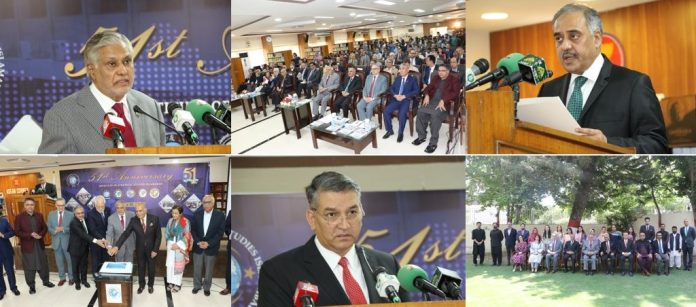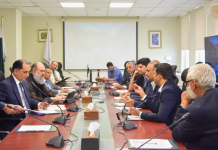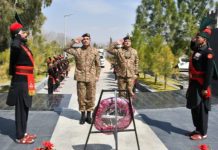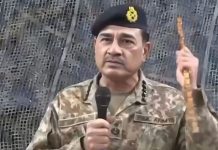ISLAMABAD, JUN 25 /DNA/ – The Institute of Strategic Studies Islamabad (ISSI) celebrated the 51st anniversary of its founding today. The Deputy Prime Minister and Foreign Minister of Pakistan, Senator Mohammad Ishaq Dar, graced the occasion as Chief Guest where he dilated in detail on Pakistan’s foreign policy in a transforming world.
Delivering his welcome remarks, DG ISSI Ambassador Sohail Mahmood underscored the growing impact of think-tanks and research organizations globally, stressing their pivotal role in generating research-based inputs, fostering informed dialogue, and impacting policy. Over the past five decades, he said, the ISSI has evolved into a formidable research organization and a reputable public sector think-tank. This journey, he emphasized, has been supported by the political and administrative leadership of the Foreign Ministry and guided by the ISSI Board of Governors.
Reflecting on the past year, Ambassador Sohail Mahmood highlighted ISSI’s proactive initiatives aimed at bridging the gap between academic and policy communities; providing a platform for inclusive, multi-stakeholder dialogue; strengthening collaboration with national stakeholders; increasing collaboration with international partners; enhancing research standards; and leveraging media and social media platforms for wider dissemination of insights. He emphasized ISSI’s thematic priorities, which encompassed analyzing global and regional developments; supporting concept of ‘comprehensive’ security; strengthening efforts to accentuate ‘pivot to geo-economics’; and reinforcing Pakistan’s strategic engagements with major powers as well as key regions including Central Asia, ASEAN and Africa. Additionally, ISSI’s engagements on issues such as the Jammu & Kashmir dispute, Afghanistan’s regional implications, Middle East dynamics, climate change impacts, and cultural diplomacy were noted as critical contributions to the policy discourse.
The Deputy Prime Minister/Foreign Minister, Senator Mohammad Ishaq Dar, in his remarks appreciated ISSI’s contributions since inception in 1973 — including gaining recognition for its high-quality research and as a platform for multidimensional dialogue among various stakeholders.
The DPM/FM underscored that the world today is undergoing profound transformations. In this regard, he noted that world leaders like President Xi and Chancellor Scholz have spoken of ‘global tectonic shifts’ and changes taking place in the world which have not been seen in a century. He added that the world is witnessing the end of one era and the beginning of a new one — marked by the emergence of a multipolar order. He emphasized that old and traditional security threats are compounded by new and non-traditional security threats and challenges. These include ongoing conflicts in Europe and the Middle East, genocide in Palestine, and simmering tensions across several continents. Disintegration of arms control regime, new arms races, unprecedented growth of new emerging technologies, food and fuel crises, Islamophobia, grey-zone conflict, and climate change present further challenges to global security.
Alluding to the intensifying major-power contestation, he noted that a specter of a new Cold War looms ominously over the global landscape. He asserted that it should be evident to all that our collective salvation lies in finding global solutions to shared problems. No single nation can resolve these issues in isolation; hence, communication and dialogue are imperative.
The DPM/FM underscored Pakistan’s strategic importance globally and regionally. Highlighting Pakistan’s perspective, he underscored its aversion to bloc politics and preference for cooperation over confrontation. He also highlighted that Pakistan’s regional policy is underpinned by the concept of “peaceful neighborhood” and the inextricable link between peace and development.
He stated that a peaceful, stable, united and prosperous Afghanistan is in Pakistan’s vital interest. Since the Taliban’s takeover, Pakistan has adopted a pragmatic approach, prioritizing both national and regional stability. He emphasized the need for Afghan soil not to be used by terrorists against any state. If the vision of a peaceful and stable Afghanistan is realized, the fruits of economic cooperation, regional integration, and connectivity would be enormous.
He described India-Pakistan relations as troubled, citing ongoing mistrust stemming from India’s actions in IIOJK on 5 August 2019. The DPM/FM said Pakistan seeks good-neighborly relations with India on the basis of mutual respect, sovereign equality, and a just and peaceful resolution of the long-standing Jammu and Kashmir dispute. He added that while Pakistan has always been receptive to constructive engagement through dialogue that includes all outstanding issues, Pakistan would never agree to unilateral approaches or attempts to impose India’s will or hegemony. He further emphasized Pakistan’s readiness to ensure strategic stability and respond to any military provocations. He expressed the hope that the BJP-led NDA government would have sober reflection, revisit India’s policies and postures that have bedeviled bilateral relations and regional cooperation, and take tangible steps that move the relationship in a positive direction.
The DPM/FM emphasized Pakistan’s enduring friendship with China as crucial for stability in the region and beyond, highlighting their commitment to ensuring safety and security of Chinese personnel and projects and enhancing bilateral relations. He praised the transformative impact of the CPEC on Pakistan’s economy and development. Additionally, he stressed efforts to strengthen ties with Iran, Gulf countries, Turkiye, and Central Asia and Azerbaijan, prioritizing regional connectivity.
He highlighted that the guiding principle of Pakistan’s foreign policy is to enhance Pakistan’s diplomatic space and autonomy of action including through good relations with all major powers, especially the United States, China, Russia, EU, Japan and ASEAN — as forging closer ties is crucial for navigating today’s complex world. This expansive foreign policy agenda requires substantial resources, which must be effectively utilized under the current environment.
On the occasion, the ISSI’s 5 Centres presented the DPM/FM with their new Books/Special Reports, covering themes that are in tandem with the needs of Pakistan. The CAMEA presented its book titled ‘The Return of the Taliban: International and Regional Perspectives’; ISC presented its book titled ‘Critical Issues Facing South Asia: Politics, Security, & Non-Traditional Challenges’; and CSP presented its book on ‘Pakistan’s Pathway to Development: Integrated Economy, Environment & Society’. The CPSC presented its report ‘Shanghai Cooperation Organization: A Focus on Growth, Evolution, and Collaboration’; and ACDC presented its report titled ‘India’s Maritime Buildup: Implications for the Indian Ocean.’
The Chairman and DG ISSI presented a Special shield to the Chief Guest, which was followed by the cutting of a cake celebrating ISSI’s 51st anniversary.
The event was attended by a large number of former diplomats, senior officials, members of the Islamabad-based Diplomatic Corps, academics, scholars and researchers, and representatives of civil society, think-tanks, and the media.












